Why is Redis so fast?
Redis is a NoSQL database based on key-value pairs. Redis's Value can be composed of various data structures and algorithms such as String, hash, list, set, zset, Bitmaps, HyperLogLog, etc. Redis has many functions, such as key expiration, publish and subscribe, transactions, Lua scripts, sentinels, Cluster, etc.
According to official performance data, Redis can execute commands at a very fast speed, and its QPS can reach more than 100,000. So this article mainly introduces where Redis is fast, mainly including the following points:
1. Development language
Now we all use high-level languages for programming, such as Java, python etc. You may think that C language is very old, but it is really useful. After all, the Unix system is implemented in C, so C language is a language that is very close to the operating system. Redis is developed in C language, so the execution will be faster.
One more thing, students should focus on learning C language because it helps to better understand the computer operating system. Don't think that after learning a high-level language, you don't have to pay attention to the bottom layer. The debt you owe will always have to be repaid. Here is a more difficult book to recommend, "In-depth Understanding of Computing Systems".
2. Pure memory access
Redis uses memory to store all data, so there is no need to read data from disk for non-data synchronization during normal operation, so The number of IOs is 0. The memory response time is about 100 nanoseconds, which is an important basis for the fast speed of Redis. Let’s first look at the speed of the CPU:
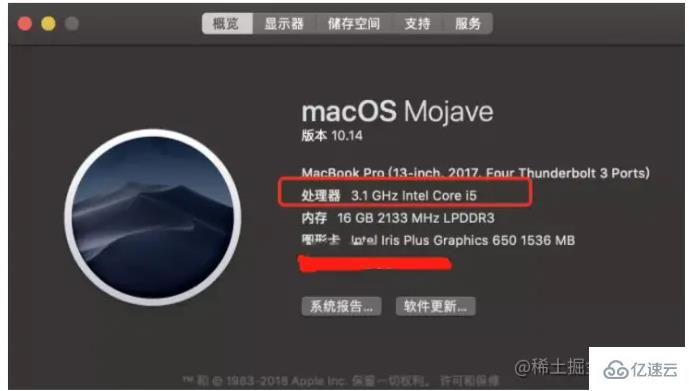
Take my computer as an example. Its main frequency is 3.1G, which means it can execute 3.1 billion instructions per second. The CPU's world view processing speed is very slow. In comparison, the memory is 100 times slower and the disk is 1,000,000 times slower. Do you think this is fast?
I borrowed a picture from "In-depth Understanding of Computer Systems", which shows a typical memory hierarchy. At the L0 layer, the CPU can access it in one clock cycle, and the SRAM-based cache is renewed. They can be accessed in a few CPU clock cycles, and then DRAM-based main memory, which can be accessed in tens to hundreds of clock cycles.
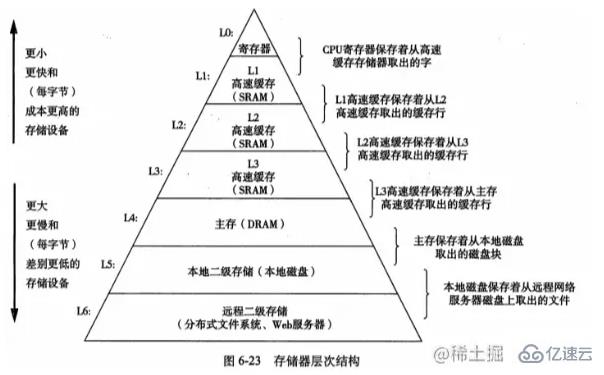
3. Single thread
Single thread can simplify the implementation of the algorithm, but it is not only difficult to implement concurrent data structures, but also difficult to test. Very troublesome. In server-side development, locks and thread switching are usually performance killers, and using a single thread can avoid the consumption they bring. Of course, single threading will also have its shortcomings, which is also Redis's nightmare: blocking. If the execution of a command is too long, it will cause other commands to be blocked, which is very fatal for Redis, so Redis is a database for fast execution scenarios.
In addition to Redis, Node.js is also single-threaded, and Nginx is also single-threaded, but they are both models of high-performance servers.
4. Non-blocking multi-channel I/O multiplexing mechanism
Before this, let’s talk about how traditional blocking I/O works: when using When read or write reads or writes a certain file descriptor (File Descriptor FD), if the data is not received, the thread will be suspended until the data is received.
Although the blocking model is easy to understand, it will not be used when multiple client tasks need to be processed.
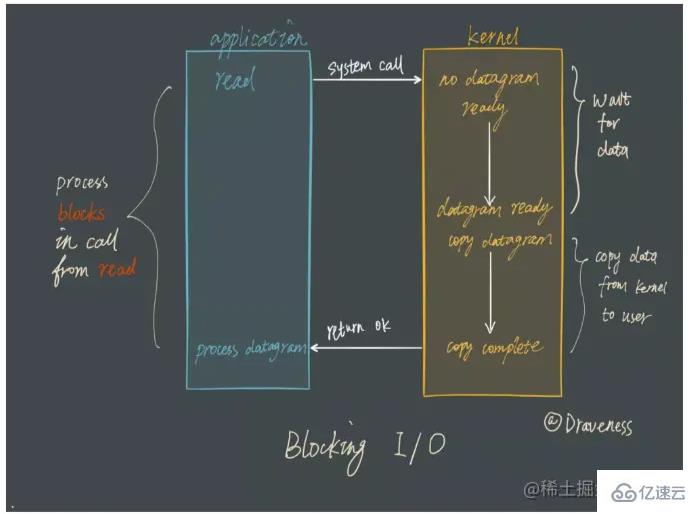
#I/O multiplexing actually means that the management of multiple connections can be in the same process. Multi-channel refers to network connections, multiplexing is just the same thread. In network services, the role of I/O multiplexing is to notify the business code of multiple connection events at one time. The processing method is determined by the business code.
In the I/O multiplexing model, the most important function call is the I/O multiplexing function. This method can monitor the reading and writing of multiple file descriptors (fd) at the same time. When some of the fds are readable/writable, this method will return the number of readable/writable fds.
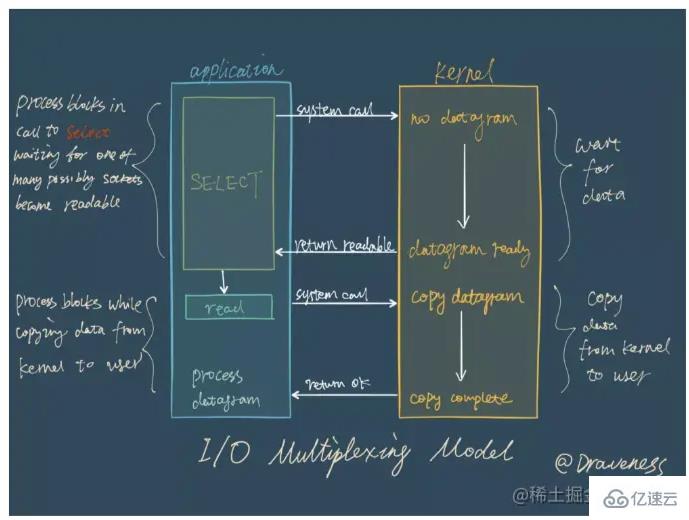
Redis uses epoll as the implementation of I/O multiplexing technology, and Redis's own event processing model converts epoll's read, write, close, etc. events without wasting too much time on network I/O. Realize monitoring of multiple FD reads and writes to improve performance.
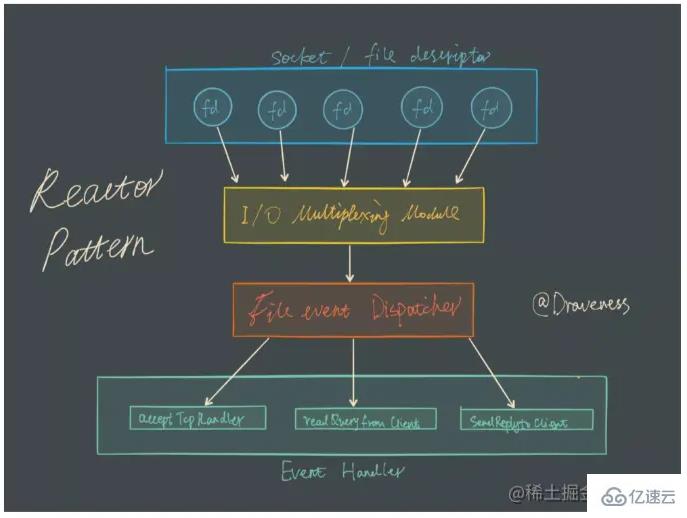
Let’s give a vivid example. For example, a tcp server handles 20 client sockets.
A plan: Sequential processing. If the first socket is slow in reading data due to the network card, once it is blocked, the rest will be messed up.
Plan B: Create a clone sub-process for each socket request. Not to mention that each process consumes a large amount of system resources. The process switching alone is enough for the operating system to be tiring.
C scheme (I/O multiplexing model, epoll): Register the fd corresponding to the user socket into epoll (actually what is passed between the server and the operating system is not the fd of the socket but the data structure of fd_set), and then epoll Just tell which sockets need to be read/written, and only need to process those active and changing socket fds.
In this way, the entire process will only block when epoll is called, and sending and receiving customer messages will not block.
The above is the detailed content of Why is Redis so fast?. For more information, please follow other related articles on the PHP Chinese website!

Hot AI Tools

Undresser.AI Undress
AI-powered app for creating realistic nude photos

AI Clothes Remover
Online AI tool for removing clothes from photos.

Undress AI Tool
Undress images for free

Clothoff.io
AI clothes remover

AI Hentai Generator
Generate AI Hentai for free.

Hot Article

Hot Tools

Notepad++7.3.1
Easy-to-use and free code editor

SublimeText3 Chinese version
Chinese version, very easy to use

Zend Studio 13.0.1
Powerful PHP integrated development environment

Dreamweaver CS6
Visual web development tools

SublimeText3 Mac version
God-level code editing software (SublimeText3)

Hot Topics
 1379
1379
 52
52
 How to build the redis cluster mode
Apr 10, 2025 pm 10:15 PM
How to build the redis cluster mode
Apr 10, 2025 pm 10:15 PM
Redis cluster mode deploys Redis instances to multiple servers through sharding, improving scalability and availability. The construction steps are as follows: Create odd Redis instances with different ports; Create 3 sentinel instances, monitor Redis instances and failover; configure sentinel configuration files, add monitoring Redis instance information and failover settings; configure Redis instance configuration files, enable cluster mode and specify the cluster information file path; create nodes.conf file, containing information of each Redis instance; start the cluster, execute the create command to create a cluster and specify the number of replicas; log in to the cluster to execute the CLUSTER INFO command to verify the cluster status; make
 How to clear redis data
Apr 10, 2025 pm 10:06 PM
How to clear redis data
Apr 10, 2025 pm 10:06 PM
How to clear Redis data: Use the FLUSHALL command to clear all key values. Use the FLUSHDB command to clear the key value of the currently selected database. Use SELECT to switch databases, and then use FLUSHDB to clear multiple databases. Use the DEL command to delete a specific key. Use the redis-cli tool to clear the data.
 How to use the redis command
Apr 10, 2025 pm 08:45 PM
How to use the redis command
Apr 10, 2025 pm 08:45 PM
Using the Redis directive requires the following steps: Open the Redis client. Enter the command (verb key value). Provides the required parameters (varies from instruction to instruction). Press Enter to execute the command. Redis returns a response indicating the result of the operation (usually OK or -ERR).
 How to use single threaded redis
Apr 10, 2025 pm 07:12 PM
How to use single threaded redis
Apr 10, 2025 pm 07:12 PM
Redis uses a single threaded architecture to provide high performance, simplicity, and consistency. It utilizes I/O multiplexing, event loops, non-blocking I/O, and shared memory to improve concurrency, but with limitations of concurrency limitations, single point of failure, and unsuitable for write-intensive workloads.
 How to read the source code of redis
Apr 10, 2025 pm 08:27 PM
How to read the source code of redis
Apr 10, 2025 pm 08:27 PM
The best way to understand Redis source code is to go step by step: get familiar with the basics of Redis. Select a specific module or function as the starting point. Start with the entry point of the module or function and view the code line by line. View the code through the function call chain. Be familiar with the underlying data structures used by Redis. Identify the algorithm used by Redis.
 How to implement the underlying redis
Apr 10, 2025 pm 07:21 PM
How to implement the underlying redis
Apr 10, 2025 pm 07:21 PM
Redis uses hash tables to store data and supports data structures such as strings, lists, hash tables, collections and ordered collections. Redis persists data through snapshots (RDB) and append write-only (AOF) mechanisms. Redis uses master-slave replication to improve data availability. Redis uses a single-threaded event loop to handle connections and commands to ensure data atomicity and consistency. Redis sets the expiration time for the key and uses the lazy delete mechanism to delete the expiration key.
 How to read redis queue
Apr 10, 2025 pm 10:12 PM
How to read redis queue
Apr 10, 2025 pm 10:12 PM
To read a queue from Redis, you need to get the queue name, read the elements using the LPOP command, and process the empty queue. The specific steps are as follows: Get the queue name: name it with the prefix of "queue:" such as "queue:my-queue". Use the LPOP command: Eject the element from the head of the queue and return its value, such as LPOP queue:my-queue. Processing empty queues: If the queue is empty, LPOP returns nil, and you can check whether the queue exists before reading the element.
 How to make message middleware for redis
Apr 10, 2025 pm 07:51 PM
How to make message middleware for redis
Apr 10, 2025 pm 07:51 PM
Redis, as a message middleware, supports production-consumption models, can persist messages and ensure reliable delivery. Using Redis as the message middleware enables low latency, reliable and scalable messaging.




